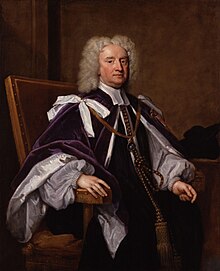Sir Jonathan Trelawny
|
The Right Reverend Sir Jonathan Trelawny Bt |
|
|---|---|
| Bishop of Winchester | |
 |
|
| Church | Church of England |
| See | Winchester |
| In office | 1707–1721 |
| Predecessor | Peter Mews |
| Successor | Charles Trimnell |
| Other posts |
Bishop of Bristol (1685–1689) Bishop of Exeter (1689–1707) |
| Personal details | |
| Born |
24 March 1650 Trelawne, Cornwall, England |
| Died | 19 July 1721 (aged 71) Chelsea, Middlesex, England |
| Education | Westminster School |
| Alma mater | Christ Church, Oxford |
Sir Jonathan Trelawny, 3rd Baronet (24 March 1650 – 19 July 1721) was a British Bishop of Bristol, Bishop of Exeter and Bishop of Winchester. Trelawny is best known for his role in the events leading up to the Glorious Revolution which are referenced in the Cornish anthem The Song of the Western Men.
He was born at Trelawne in the parish of Pelynt, Cornwall. He was educated at Westminster School and then went to Christ Church, Oxford at the start of the Michaelmas term of 1668 where he distinguished himself as a scholar. A staunch royalist, he was ordained in 1673 and became a beneficed clergyman. He was appointed rector of South Hill on 4 October and of St. Ives on 12 December 1677, becoming Bishop of Bristol in 1685. He was one of the Seven Bishops tried under James II.
Trelawny and the other bishops petitioned against James II's Declaration of Indulgence in 1687 and 1688, (granting religious tolerance to Catholics) and as a result he was arrested and imprisoned in the Tower of London on charges of seditious libel. The bishops said that whilst they were loyal to King James II, their consciences would not agree to allowing freedom of worship to Catholics even if it were to be within the privacy of their own homes as the Declaration proposed; thus they could not sign. Trelawny was held for three weeks before trial, then tried and acquitted; this led to great celebrations, with bells being rung in his home parish of Pelynt.
...
Wikipedia
